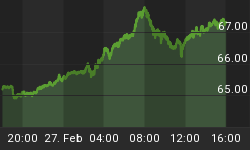I was asked a few days ago by Zócalo Public Square, a not-for-profit daily Ideas Exchange, to contribute a brief comment to coincide with their upcoming event "Can We Fix What's Wrong With Banking?"
I was specifically asked to address the question "should we have bailed out the banks?" Here is my response:
No, we should not have bailed them out. That's the easy question.
Now that we have bailed them out, however, here's the important question: "Will we fix what's wrong with banking before there is a global currency crisis?"
On that score I have my doubts. The simple fact of the matter is we have a massive mountain of debt everywhere you look: Federal debt, State and local debt, student loans, housing, unfunded liabilities in Medicare and Social Security, and untenable pension promises at every level of government.
Most agree that is a problem. Unfortunately, that's where the agreement stops. Yet, before we can address the debt crisis, we have to understand how it happened.
The source of the debt crisis is two-fold:
- Fractional Reserve Lending
- Fed (central banks in general)
Everything else is a sideshow, but few realize it.
Symptoms vs. Problems
The symptoms of the debt-bubble are slack demand, a lack of jobs, and stagnant growth. Most policymakers are hell-bent on attacking those symptoms, not the problem.
Many point to the end of Glass-Steagall, rating agencies, "too big to fail," bank bailouts, and excess spending by governments. There are screams for more regulation in nearly every corner. The unions want more handouts. The socialists want to redistribute wealth. Those on fixed income want bigger Social Security checks.
The Keynesians and Monetarists want to attack the symptoms with more government spending and more central bank printing. The average 8th grader can see how foolish most of those ideas are, but the average economist can't, and the average government bureaucrat does not want to be told he has to stop spending.
Decades of Foolishness
The notion that a nation can spend its way to prosperity has been disproved time and time again. The U.S. housing bubble was a direct result of the Fed bailing out banks in the wake of the dot-com bust.
Japan, once the world's largest creditor, now has a debt-to-GDP ratio approaching 250 percent, the highest in the industrialized world. It took three decades of foolish spending for Japan to achieve that debt-to-GDP level, and Japan believes it failed because it did not try hard enough.
Central banks blow bubbles of increasing amplitude over time. And every step of the way they bail out banks that get into trouble. This is the legacy of central banks, and especially the legacy of the Greenspan and Bernanke Fed
Income Skew
I have written before why the rich get richer and the poor get poorer (see Top 1% Received 121% of Income Gains During the Recovery, Bottom 99% Lose .4%; How, Why, Solutions)
In response, a Reader Asked Me to Prove "Inflation Benefits the Wealthy" (At the Expense of Everyone Else)
Please see the article for the evidence. Then, once you understand what the Fed is doing, the solutions should be easy to spot.
Solutions
The solution to the symptoms of massive income disparity, a dearth of jobs, and lack of growth is not wage caps on executive pay or hikes in the minimum wage or a return of Glass-Steagall. The real solution is elimination of the Fed, elimination of fractional reserve lending, and a return to sound money policies that do not benefit the already wealthy at the expense of everyone else.
Can we fix the problem? Of course we can. I just outlined how. But if it's so easy, then why don't we do it?
The answer to that question is remarkably easy. All you need to do is figure out who benefits from inflation. I addressed that in detail in Inflation Targeting Revisited; Three Major Fed-Sponsored Bubbles; Who Benefits From Inflation?
Here's the short answer: the banks, the wealthy, and the politicians are the ones who benefit from inflation, and they are also in control of the system.
So, are we going to fix what's wrong with banking before there is a global currency crisis? I am betting against that idea, holding gold as my method.
Wine Country Conference
I am hosting an economic conference on April 5 in Sonoma, California. Proceeds go to the Les Turner ALS Foundation (Lou Gehrig's Disease).
Please see My Wife Joanne Has Passed Away; Stop and Smell the Lilacs for my association with the disease.
To learn about the economic conference with world-class speakers including John Hussman, Michael Pettis, Jim Chanos, John Mauldin, Mike "Mish" Shedlock, Chris Martenson with guest moderator Lauren Lyster and other Special Guests, please visit Wine Country Conference April 5, 2013
Read more at http://globaleconomicanalysis.blogspot.com/2013/03/can-we-fix-whats-wrong-with-banking.html#dG7dTer9a7SmVOrb.99















